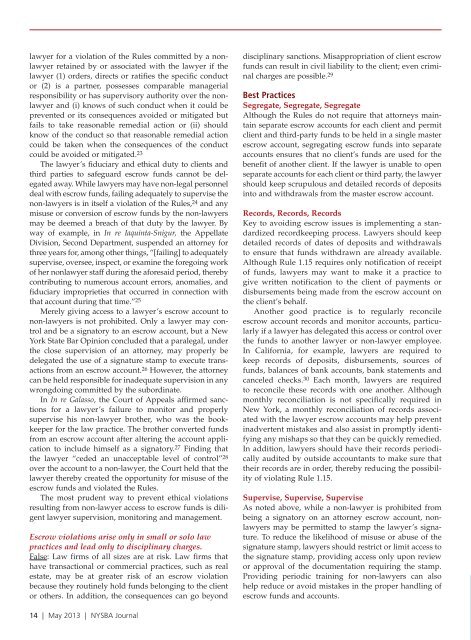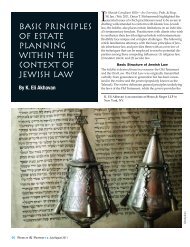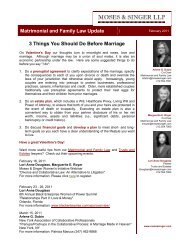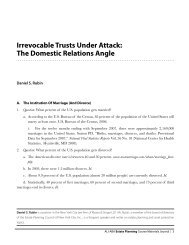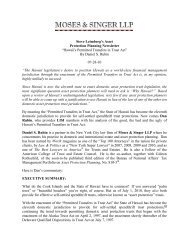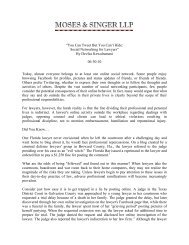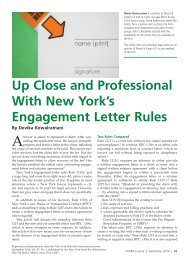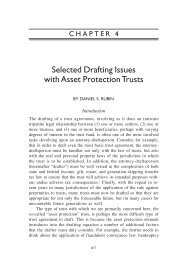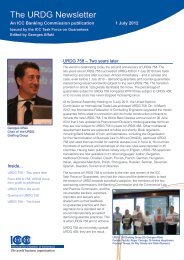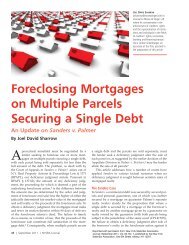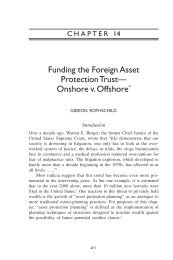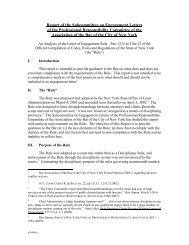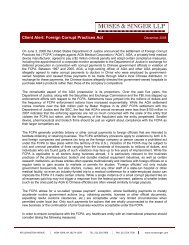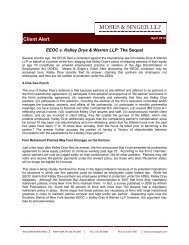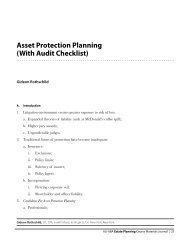Create successful ePaper yourself
Turn your PDF publications into a flip-book with our unique Google optimized e-Paper software.
lawyer for a violation of the Rules committed by a nonlawyerretained by or <strong>as</strong>sociated with the lawyer if thelawyer (1) orders, directs or ratifies the specific conductor (2) is a partner, possesses comparable managerialresponsibility or h<strong>as</strong> supervisory authority over the nonlawyerand (i) knows of such conduct when it could beprevented or its consequences avoided or mitigated butfails to take re<strong>as</strong>onable remedial action or (ii) shouldknow of the conduct so that re<strong>as</strong>onable remedial actioncould be taken when the consequences of the conductcould be avoided or mitigated. 23The lawyer’s fiduciary and ethical duty to clients andthird parties to safeguard escrow funds cannot be delegatedaway. While lawyers may have non-legal personneldeal with escrow funds, failing adequately to supervise thenon-lawyers is in itself a violation of the Rules, 24 and anymisuse or conversion of escrow funds by the non-lawyersmay be deemed a breach of that duty by the lawyer. Byway of example, in In re Iaquinta-Snigur, the AppellateDivision, Second Department, suspended an attorney forthree years for, among other things, “[failing] to adequatelysupervise, oversee, inspect, or examine the foregoing workof her nonlawyer staff during the aforesaid period, therebycontributing to numerous account errors, anomalies, andfiduciary improprieties that occurred in connection withthat account during that time.” 25Merely giving access to a lawyer’s escrow account tonon-lawyers is not prohibited. Only a lawyer may controland be a signatory to an escrow account, but a NewYork State Bar Opinion concluded that a paralegal, underthe close supervision of an attorney, may properly bedelegated the use of a signature stamp to execute transactionsfrom an escrow account. 26 However, the attorneycan be held responsible for inadequate supervision in anywrongdoing committed by the subordinate.In In re Gal<strong>as</strong>so, the Court of Appeals affirmed sanctionsfor a lawyer’s failure to monitor and properlysupervise his non-lawyer brother, who w<strong>as</strong> the bookkeeperfor the law practice. The brother converted fundsfrom an escrow account after altering the account applicationto include himself <strong>as</strong> a signatory. 27 Finding thatthe lawyer “ceded an unacceptable level of control” 28over the account to a non-lawyer, the Court held that thelawyer thereby created the opportunity for misuse of theescrow funds and violated the Rules.The most prudent way to prevent ethical violationsresulting from non-lawyer access to escrow funds is diligentlawyer supervision, monitoring and management.Escrow violations arise only in small or solo lawpractices and lead only to disciplinary charges.False: Law firms of all sizes are at risk. Law firms thathave transactional or commercial practices, such <strong>as</strong> realestate, may be at greater risk of an escrow violationbecause they routinely hold funds belonging to the clientor others. In addition, the consequences can go beyonddisciplinary sanctions. Misappropriation of client escrowfunds can result in civil liability to the client; even criminalcharges are possible. 29Best PracticesSegregate, Segregate, SegregateAlthough the Rules do not require that attorneys maintainseparate escrow accounts for each client and permitclient and third-party funds to be held in a single m<strong>as</strong>terescrow account, segregating escrow funds into separateaccounts ensures that no client’s funds are used for thebenefit of another client. If the lawyer is unable to openseparate accounts for each client or third party, the lawyershould keep scrupulous and detailed records of depositsinto and withdrawals from the m<strong>as</strong>ter escrow account.Records, Records, RecordsKey to avoiding escrow issues is implementing a standardizedrecordkeeping process. Lawyers should keepdetailed records of dates of deposits and withdrawalsto ensure that funds withdrawn are already available.Although Rule 1.15 requires only notification of receiptof funds, lawyers may want to make it a practice togive written notification to the client of payments ordisbursements being made from the escrow account onthe client’s behalf.Another good practice is to regularly reconcileescrow account records and monitor accounts, particularlyif a lawyer h<strong>as</strong> delegated this access or control overthe funds to another lawyer or non-lawyer employee.In California, for example, lawyers are required tokeep records of deposits, disbursements, sources offunds, balances of bank accounts, bank statements andcanceled checks. 30 Each month, lawyers are requiredto reconcile these records with one another. Althoughmonthly reconciliation is not specifically required inNew York, a monthly reconciliation of records <strong>as</strong>sociatedwith the lawyer escrow accounts may help preventinadvertent mistakes and also <strong>as</strong>sist in promptly identifyingany mishaps so that they can be quickly remedied.In addition, lawyers should have their records periodicallyaudited by outside accountants to make sure thattheir records are in order, thereby reducing the possibilityof violating Rule 1.15.Supervise, Supervise, SuperviseAs noted above, while a non-lawyer is prohibited frombeing a signatory on an attorney escrow account, nonlawyersmay be permitted to stamp the lawyer’s signature.To reduce the likelihood of misuse or abuse of thesignature stamp, lawyers should restrict or limit access tothe signature stamp, providing access only upon reviewor approval of the documentation requiring the stamp.Providing periodic training for non-lawyers can alsohelp reduce or avoid mistakes in the proper handling ofescrow funds and accounts.14 | May 2013 | NYSBA Journal


